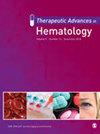患者对口服地西他滨/塞达脲苷治疗骨髓增生异常综合征/肿瘤的看法
IF 3.1
3区 医学
Q2 HEMATOLOGY
引用次数: 0
摘要
背景:低甲基化药物(HMA)是指南推荐的治疗高风险骨髓增生异常综合征/肿瘤(MDS)的药物。然而,此前一项针对MDS患者的调查报告显示,静脉注射(IV)和皮下注射(SC)HMA疗法存在诸多挑战,包括与用药相关的疼痛和对日常活动的干扰;大多数患者还表示,如果有口服疗法,他们更愿意改用口服疗法。目的:本研究评估了接受口服地西他滨/西达嘧啶(DEC-C)治疗的美国 MDS 患者的观点,DEC-C 是静脉注射/皮下注射 HMA 的替代疗法。方法:本研究对 2021 年至 2022 年期间开过口服 DEC-C 处方的美国成年 MDS 患者进行了在线调查(2022 年 11 月 10 日至 2022 年 12 月 5 日)。其中 123 人(82%)仍在接受口服 DEC-C,27 人(18%)已停止口服 DEC-C 治疗。半数患者(50%)口服 DEC-C 的时间已达 6 个月。大多数患者表示治疗方便(83%),对治疗感到满意(86%)。大多数患者还表示对日常活动(82%)、社交活动(78%)和工作效率(78%)的干扰很小/没有。当问及对生活质量(QOL)的负面影响时,最常见的是治疗副作用(30% 的受访者)。结论:调查结果表明,与静脉注射/静脉注射HMA相比,口服DEC-C对常规日常活动的影响很小/没有影响,并且改善了患者的生活质量,突出了口服DEC-C减轻肠外HMA治疗负担的潜力。本文章由计算机程序翻译,如有差异,请以英文原文为准。
Patients’ perspectives on oral decitabine/cedazuridine for the treatment of myelodysplastic syndromes/neoplasms
Background:Hypomethylating agents (HMAs) are guideline-recommended treatment for higher-risk myelodysplastic syndromes/neoplasms (MDS). However, a prior survey of patients with MDS reported challenges with intravenous (IV) and subcutaneous (SC) HMA therapies, including pain related to treatment administration and interference with daily activities; most patients also indicated a preference to switch to an oral therapy if one were available.Objectives:This study evaluated the perspectives of US patients with MDS receiving oral decitabine/cedazuridine (DEC-C), an alternative to IV/SC HMAs.Methods:An online survey was conducted among adult patients with MDS in the United States (10 November 2022 to 5 December 2022) who had filled a prescription for oral DEC-C between 2021 and 2022.Results:A total of 150 patients completed the survey; 61% were aged ⩾60 years and 63% were male. Of these, 123 (82%) were still receiving oral DEC-C, and 27 (18%) had stopped oral DEC-C treatment. Half (50%) of patients had received oral DEC-C for ⩾6 months. The majority reported that treatment was convenient (83%) and that they were satisfied with treatment (86%). Most patients also reported very little/no interference with regular daily activities (82%), social activities (78%), and productivity (78%). When queried about negative impacts on quality of life (QOL), treatment side effects were the most commonly reported (30% of respondents). Among patients who had previously received IV/SC HMAs ( n = 91), most agreed that oral DEC-C interfered less with daily life (91%) and had experienced improvement in QOL (85%) compared with previous treatment; 91% reported that oral DEC-C reduced the number of times they needed to travel to a healthcare facility.Conclusion:Survey results suggest very little/no impact on regular daily activities and improved QOL with oral DEC-C relative to IV/SC HMAs, highlighting the potential for oral DEC-C to reduce the treatment burden associated with parenteral HMA therapy.
求助全文
通过发布文献求助,成功后即可免费获取论文全文。
去求助
来源期刊

Therapeutic Advances in Hematology
HEMATOLOGY-
CiteScore
4.30
自引率
0.00%
发文量
54
审稿时长
7 weeks
期刊介绍:
Therapeutic Advances in Hematology delivers the highest quality peer-reviewed articles, reviews, and scholarly comment on pioneering efforts and innovative studies across all areas of hematology. The journal has a strong clinical and pharmacological focus and is aimed at clinicians and researchers in hematology, providing a forum in print and online for publishing the highest quality articles in this area.
 求助内容:
求助内容: 应助结果提醒方式:
应助结果提醒方式:


